American View
Feature
Young Jews Are Bringing the Catskills Back to Life
When Kirsten Harlow Foster and her husband, Sims Foster, survey the Brooklynites sipping locally brewed pints at their Livingston Manor farm-to-table tavern, they see more than weekend patrons. The 40-something pair behind The Arnold House and their growing outfit, Foster Supply Hospitality, see the latest iteration of American leisure, Catskills-style, as manifested in an era of green living and roughhewn chic that nods to (or perhaps winks at?) the region’s storied heritage.
Modern adventurers “like having a real connection to a place—an authentic experience, not one that’s curated,” explains Harlow Foster, whose father, a Jew from the Bronx, snuck into shows at the Concord Resort Hotel while working summers there during college. Sims has his own memories of the Concord; his family took him to the then-aging resort for haircuts and ice cream floats during his 1980s childhood.
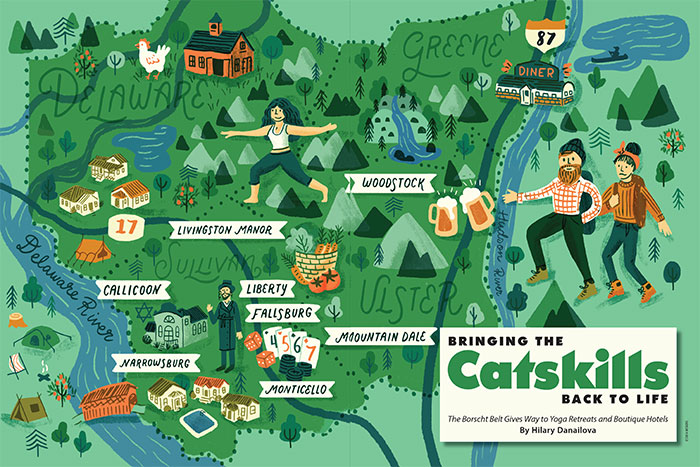
Today, the Fosters leave hand-drawn maps for guests at their four properties, which, in addition to The Arnold House, include The DeBruce, Nine River Road and North Branch Inn. It’s territory they know well, as Sims is the fourth generation to grow up in Livingston Manor, where the couple is now raising their two young children amid a culturally rich Jewish milieu. In a big-box, digitized world, historical provenance is its own kind of luxury, Harlow Foster says: “A farmhouse next to a trail—that kind of simplicity is what resonates the most.”
Read Hilary Danailova’s travel report on the region, The Allure of the Catskills for the Jewish Traveler.
It was that simple rustic charm that attracted legendary Jewish clothing designer Ralph Lauren to shoot recent advertising campaigns at an 1873 Catskills barn restored by the Brooklyn-based real estate developers Avi and Gabi Adiv and Joshua Roth. L.L. Bean has also shot at the barn, one of nearly a dozen properties the Michigan-born trio has rehabbed for millennials.
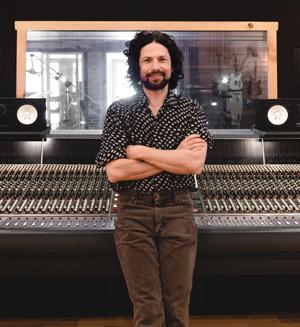
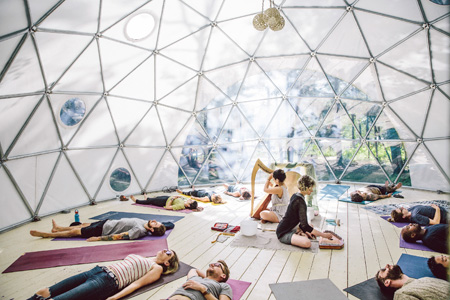
“I don’t know anywhere else within 100 miles of Manhattan where you can get houses under $299,000,” says Avi Adiv, referring to his Brooklyn clientele’s typical weekend-house budget. The Catskills, he adds, are reviving the way Brooklyn neighborhoods did earlier in the century, with young professionals—many of them Jewish—snapping up “undervalued” country homes and remaking the scene in their own image.
Across the entire Catskills region, the revival is the result of multiple market forces as well as the involvement of a new generation of Jews—from the unaffiliated to the ultra-Orthodox—who arrive as tourists, weekend-home buyers and city transplants relocating to the mountains year-round. These rural communities overlap in ways that would be unlikely back in the city, where Jewish options are far more numerous and defined. In the Catskills, non-Orthodox Jews may daven at historic Orthodox shuls; secular Jews drop by kosher bakeries.
Foxtrot at the Concord has given way to farmers markets and the Weekend of Chamber Music series, which brings string quartets to the Eddie Adams Barn in Jeffersonville. On Fridays, New York City denizens head upstate for yoga retreats and meditation at the Outlier Inn in Woodridge, where musician-owner Josh Druckman, 43, raises chickens and hosts recording artists near the onetime site of his grandparents’ Jewish summer camp, Kewanee, in Parksville.
The Outlier and similar inns represent a far cry from the lavish postwar resorts for which this region is best known: Grossinger’s, the Concord, Kutsher’s and more than 500 other properties that defined the so-called Borscht Belt in its Jewish vacation heyday, roughly from the 1920s through the late 1960s. (Although the Borscht Belt was concentrated in Sullivan County, about 100 miles north of Manhattan, the Catskill Mountains also cover Greene, Ulster and Delaware Counties.)
This marked the era of the hospitality arms race, when hotels conducted annual summer exercises in one-upmanship through ever posher facilities, more fabulous amenities and bigger names for guests to drop—from celebrity golf pros to marquee comics like Mel Brooks and Joan Rivers.
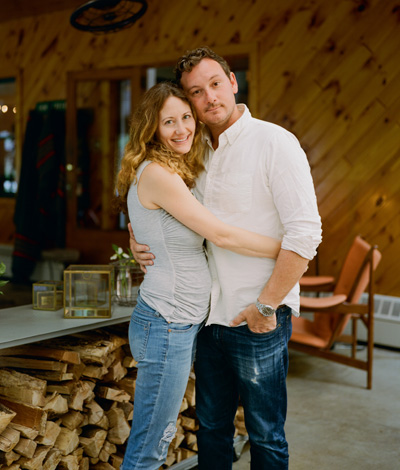
Conventional wisdom has it that the Catskills as we knew it died at some point in the 1970s, or maybe the 1980s, when Grossinger’s was sold. But in fact, the current rebirth is only the latest in a reincarnation cycle that dates back at least to the 1800s, when well-to-do New Yorkers discovered the area. In the generations since, arguably no place has better reflected the changing shape of the American vacation as well as the evolution of American Jewish society.
“Everything turns over,” reflects Marisa Scheinfeld, a 39-year-old locally born photographer who immortalized the ghostly remnants of mid-20th-century hotels in her 2016 photo book, The Borscht Belt: Revisiting the Remains of America’s Jewish Vacationland. Scheinfeld grew up when the Catskills “weren’t cool anymore”; now, her millennial set is rediscovering the charms of turquoise kitchens. “20- and 30-somethings love retro,” Scheinfeld observes. “But the reason people are going to the Catskills now is the same reason people went 100 years ago—its proximity to New York City, plus it’s beautiful.”
That simple rationale has inspired vacationers since the 1824 opening of the Catskill Mountain House, the area’s first commercial lodging, which boasted American presidents among its guests. Starting around 1900, a steady trickle of Jews left sweltering urban tenements for crisp mountain air. The newcomers bought land, tried farming, discovered the soil wasn’t suitable and rented out rooms to make ends meet.
At the same time, second-generation immigrant Jews were discovering a New World novelty: the country getaway, facilitated by the automobile. Many could now afford to stay at hotels, but money wasn’t the problem; anti-Semitism was.
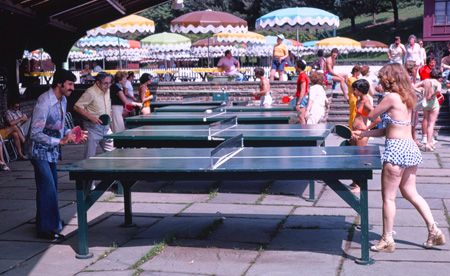
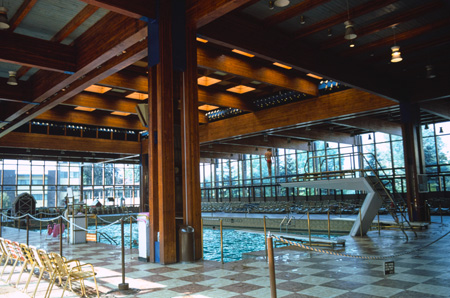
“Jews weren’t welcome almost anywhere,” says John Conway, the official Sullivan County historian and author of a half-dozen books on the Catskills. On spotting a suspiciously Semitic surname, managers would alert nearby properties by telegram, notes Conway: “They’d say things like, ‘These people wouldn’t fit in with your clientele.’ ”
Jews finally got their opening around 1915, when that clientele confronted a prospect scarier than Jewish neighbors—tuberculosis.
“People were dying in the hotels up there,” says Stephen M. Silverman, a veteran journalist and the author of The Catskills: Its History and How It Changed America. Hoteliers, desperate to conceal the epidemic, snuck corpses out through back doors, but panic spread anyhow—and a fire sale ensued for real estate in the region. “And guess who moved in? The Jews.” Entrepreneurs snapped up cheap properties, giving their Jewish brethren hotels where they were finally welcome.
The Catskills, after all, has always been a land of opportunity, not only for recreation but also for resources—locally mined bluestone- paved streets up and down the Eastern seaboard, for example—and even subterfuge. With thick forests, wide lakes and forbiddingly rocky terrain, “it was a perfect place for 1920s gangsters because you could hide there and you could get rid of bodies,” notes Silverman. Jewish gangster Dutch Schultz—né Flegenheimer—famously buried his ill-gotten gains in the frozen hills. “Every spring, people would go up looking for it,” says Silverman, but the loot was never found.
Shady goings-on notwithstanding, Jewish vacationers embraced the region. In 1914, Asher Selig Grossinger paid $450 for a chicken farm in Liberty. Drawing on their background as European innkeepers, the Grossingers purchased more land and soon set what would become a New World hospitality standard: jackets at dinner, kosher dining rooms and a smorgasbord of leisure activities as the facility upgraded to a full-scale hotel.
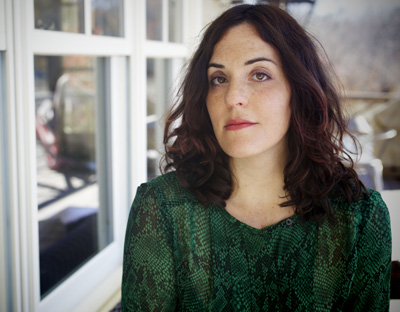
When the George Washington Bridge opened in 1939, it eased the journey north from Manhattan. By the 1940s, the Catskills vacation was an established summer ritual for many Jewish New Yorkers. The resorts were also an incubator for American talent: Jewish icons like Jackie Mason, Billy Crystal and young Jerry Seinfeld—who appeared at Kutsher’s in the waning days of the resort—honed their early acts onstage, along with Duke Ellington, Louis Armstrong and others.
“It was Hollywood East,” recalls Marc Switko, 53, a Sullivan County-based musician and therapist—he runs Outlier’s gong meditation workshops—who grew up in the Jewish Alps. Switko’s grandparents were local Jewish farmers; the family later ran small hotels. “It was the entertainment capital of the U.S. There were delicatessens, huge Jewish bakeries. All the hotels were kosher.”
During the postwar years, Sullivan County welcomed approximately a half-million Jewish visitors each summer, catering to virtually every budget and social class. The American Jewish summer camp scene also flowered in the area, as leisure trends filtered down to childhood.
Scholars point out the profound, far-reaching influence of Catskills culture on the way Americans vacation today. “When the mafia built Las Vegas hotels, they modeled them after all-inclusive Catskills resorts,” explains Silverman. Cruise ships adopted the buffet popular with the resorts’ customers, who compensated for hardscrabble childhoods with high-cholesterol abundance. “And Grossinger’s is really the original Disney World. It’s got a big fence around it, and everything you need is inside the gate.”
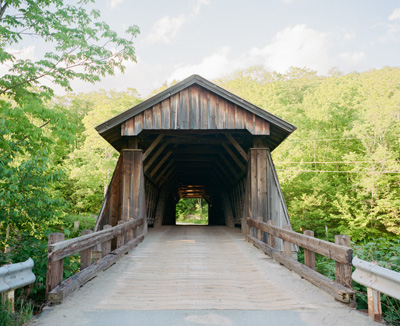
As anyone who’s watched the 1987 film Dirty Dancing knows, summers in the Catskills offered intoxicating freedom for teenagers and college-aged students. Those young generations began to develop summer rites—like sneaking into nightclubs.
“We’d climb in over the back fence. I tore many a dress,” laughs Anita Novick Lebowitz, now 86, who grew up in Liberty and Monticello, where her father owned a five-and-ten. “I got engaged one July at Brown’s Hotel in Loch Sheldrake, between the gefilte fish and the matzah ball soup.” The September 1954 wedding took place at the Pines Hotel in Fallsburg, officiated by a rabbi from the Concord. “Half the band was from Grossinger’s,” she recalled. “It was a quickie wartime wedding. Only in the Catskills could you put together a wedding between Labor Day and Rosh Hashanah.”
Hadassah chapters held affairs at the resorts, adding to the summer bustle. “Life in Monticello was exciting,” Marlene Post, a past national president of Hadassah, recalls of the postwar years. “In the summer, the town was packed. You made some of your closest friends at those bungalow colonies.”
Ah yes, those bungalow colonies. Not everyone opted for the futuristic grandeur of the mega-resorts. Bungalow colonies have long offered a modest, communal alternative, with the same families returning year after year to non-winterized cottages. But Catskills bungalows adopted the resorts’ all-inclusive model: swimming, tennis and Saturday night entertainment at “the casino,” which referred not to a gambling parlor but to the kind of clubhouse you might find in a Florida retirement complex.
“It’s just so easy,” says Stephanie Kreiner, 67, a Queens native and the president of one of these few remaining communities, Lansmans Bungalow Colony in Woodbourne, where she has spent the last 37 summers with other Jewish families from New York City. “There’s always someone around to take a walk or do something with. We play tennis or cards or mah jongg. I shouldn’t say this, but we have a happy hour every day at 4:00!”
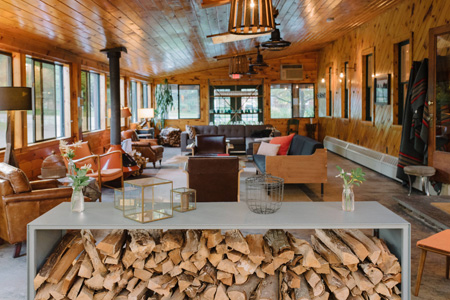
When the founding Lansman family was ready to sell, old-timers bought the 85-unit property and now run it as a co-op, with the average bungalow selling for $35,000. “It’s peaceful here. As soon as you get out of your car, you smell that fresh air,” Kreiner says.
How and why this halcyon world faded is a matter of debate. Air conditioning was a factor: When New Yorkers were no longer obliged to schlep upstate for cool breezes, beaches came into fashion, and by the 1980s, the Catskills were out; Cape Cod was in. The flaws in the resort model didn’t help; local economies never fully developed, given that vacationers could buy everything from haircuts to gasoline to Oriental rugs without leaving the facility. And as more women joined the workforce, not all mothers were able to relocate to the mountains for the summer.
Once that world declined, many of the region’s hotels were razed; others were abandoned or reborn as glatt kosher resorts to cater to the Orthodox community, like the Raleigh Hotel in South Fallsburg. The former Kutsher’s site is now the $250 million YO1 yoga and wellness retreat built by an Indian financier. The old Concord property reopened last year with two new facilities: Resorts World Catskills, the region’s first casino and high-rise, and Kartrite waterpark.
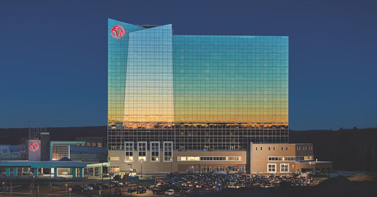
In some ways, the Jewish Catskills has come full circle. Beginning in the 1970s, virgin land and aging bungalow colonies were once again selling cheap, inspiring a new wave of Jewish vacationers—Orthodox and later ultra-Orthodox communities from Brooklyn. Today, many belong to Hasidic sects, and families increasingly choose to live in the region year-round, taking advantage of affordable real estate and plenty of room to grow. Around Fallsburg, the ubiquity of Hebrew lettering along woodsy roadsides may feel as culturally exotic as Yiddish accents did to non-Jewish farmers a hundred years ago.
Yet the area’s newest Jewish chapter, fueled by the various Orthodox groups as well as the unaffiliated, feels historically resonant.
“People are enamored with living in the Catskills,” says Rabbi Benzion Chanowitz, the Chabad spiritual leader of Landfield Avenue Synagogue in Monticello. That’s a big change from 1994, when he answered the ad for a new rabbi to reinvigorate a declining membership whose numbers had dipped into the double digits. Chanowitz has become an evangelist for the mountains, encouraging rent-squeezed city dwellers to consider Catskills living, though his efforts haven’t translated into rising membership. However, as vacant storefronts revive with artisan boutiques and kosher meat markets, he says, “I see the seeds of groups that may build infrastructure.”
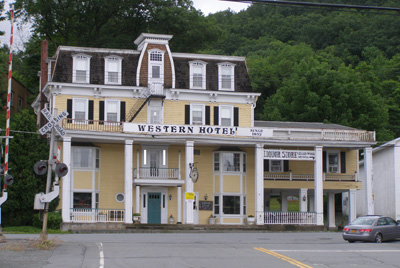
Among the groups of new pioneers are people like Sarah Banks, Foster Supply Hospitality’s 31-year-old sales director, who left the city three years ago with her chef-boyfriend and now hosts Shabbat dinners at their house in Callicoon. Banks grew up spending weekends at the now-defunct Fallsview kosher resort, “with this wonderful sense of community you don’t find in the city,” she recalls. “I was always chasing this dream of going back.”
For Banks and her liberally Jewish peers, their religious experiences in the Catskills are still largely DIY. However, she anticipates a flowering of new opportunities as more young Jews relocate to the region year-round.
“For the 16 years I’ve been here, Mountain Dale was dead and abandoned,” says the Outlier’s Josh Druckman, who spent childhood yeshiva breaks camping near his grandparents’ land. “Suddenly, there’s a hipster coffee place, hipster beauty products, a couple vintage stores.” It takes creativity to build a career in an often frozen rural zone that only comes to life on weekends, he says.
“We are a very eclectic group,” Druckman reflects. “But there’s something very comfortable about being Jewish in the Catskills. It just feels right.”
Hilary Danailova writes about travel, culture, politics and lifestyle. Read her
For more on the Catskills, read our Q&A with Grossinger’s heiress Elaine Grossinger Etess and a roundup of poignant reader memories of summers and honeymoons spent in the mountains.
THE CATSKILLS IN NOVEL FORM
There are already many shelves full of books on the Catskills—from its architecture to its impact on New York City to its summer living. The following works of fiction can be added to the stack:
Floating in the Neversink: A Novel in Stories (Black Rose Writing Trade Paperback Original) by Andrea Simon is a coming-of-age story that begins in the summer of 1955, when 9-year-old Amanda goes with her family to the Catskills for the first of many summers.
Monticello: A Borscht Belt Catskills Tale (Farnsworth and Fitzgerald Press) by Elliot Udell features a mysterious disappearance at its heart and takes place in the mid-1960s, when the Catskills boasted 600 hotels and 10,000 bungalows.
Raining Delusions: A Catskills Novel (Self-published) by photographer-writer Michael Gold is a raunchy introduction to the English-mangling Yiddish characters living in Woodridge (1925 to 1960) through the eyes of Noogie Ernstein.
The Bible of Dirty Jokes (Four Way Books) by Eileen Pollack, who grew up in Liberty, N.Y., is a contemporary mystery that follows Ketzel Weinrach as she seeks her missing brother Potsie, traveling from Borscht Belt hotels to the strip clubs of Las Vegas.










 Facebook
Facebook Instagram
Instagram Twitter
Twitter
Patty says
I grew up in Liberty in the 70’s! We had everything in town. Department Stores, the infamous Triangle Diner 24/7 and lakes, rivers, mountains and hills! We also had a plethora of Resorts and camps! Clean crisp air and delish water!!! I spent my days gardening and evenings at the hotels seeing live performance shows and dancing is high end Clubs!!! And, Oy! The pizza was an Italian Delight!!! Down hill skiing was another favorite, horseback riding in the summers and numerous swimming locations. Hotel pools, clear water lakes and clean, clear brooks running from the mountains! River rafting and swimming via the Delaware River, Beaverkill River, Willowemoc, Neversink and so on! Water so clean it was healthfully drinkable! Life there was like a vacation. The air was so clean and crisp I felt like I could walk forever. So energizing with excitement of four storybook seasons! We really had it all under a never ending sea of stars!
Elinor Cohen Fields says
My father was a partner in the Liberty Pharmacy with two brothers by the name of Klugman. My father lived at the farm house with the Grossingers , before it was a hotel in the 1930`s. My mother came up to the mountains to recover after an appendectomy. they met because Jennie was taking in boarders. He sold his share and moved back to N.Y.C. They married in 1932. We went back many times. I remember going to eat at Singers restaurant with my children in the 1950`s. There was one elderly waitress that remembered my father Harry Cohen.
When I got married my husbands uncle was a partner in the Flamingo Hotel in South Fallsburg. It had a mushroom shaped pool. Everyone said with the racetrack and a casino they would all do very well.
We many good times there. The weather was beautiful , the water refreshing and the food delicious and plentiful. I think the racetrack is gone now, but they do have a casino. Time marches on, in that beautiful countryside
Jeff Goldner says
My family owned Singer’s. Glad you have found memories. My dad was a childhood friend of Aaron Klugman, and we were neighbors with some of the Klugmans.
dona abramson says
My grandparents had an antique jewelry store ( eddies antiques)across fromSingers! Deli and Chinese food together!we went there often!
My first and best Boston Cream Pie was there! And Alma the waitress!saw her last in the nursing home where my nana ended up …
Wow thanks for the memories
eugene Sherman says
Hi l want to stay in the Catskill
I cannot a,hotel or of course a bungalow.
Any other options?
Thanks sinxeeely.eugebe Sherman..
Cell 914 419 0305. I live in.Westchester
Bettyann Stryker says
I’m putting my beautiful waterfront home on the market to sell, in Emerald Green, in Rock Hill- located between Monticello and Wurtsboro.
4 br/ 2 ba (room for conversion to 6br/3ba) beautiful views, Sandy beach, boat, gazebo, trex full length deck, hardwood floors and Burber carpeting.
Beautiful new community amenities and I believe a Chana’s in the neighborhood.
718-974-9115. After 10am Bettyann
Elliot Udell says
I recently had a book published which is a fictionalized memoir of growing up in the heyday of the Borscht Belt. It is titled “Monticello: A Borscht Belt Catskills Tale.” It is only available at Amazon.com and is like taking a magic carpet ride back to that wonderful era where there 600 hotels and 10,000 bungalows.
Selma says
I know you. Love selma mirman rosen
Joyce says
Check out the Kerhonkson Synagogue for a modern Jewish Catskill Shabbos. Schedule can be found at
Kerhonksonsynagogue.org
Ronald says
So you really want to know my story from The Bronx to Sullivan County or upstate to Monticello to SILBERT’S the crown jewel for me from my birth 1949 through the end of high school 1967 with at least yearly visits to see the family and the friends…
Norma griffo says
Do you remember the colony across the rd? I spent my summer there for many years. The name was Stillman’s then I believe it was Lance’s. I believe my family stopped going up in 1978.
Marc says
It was definitely called Lance’s b/c my family stayed there for several years after having been at Slatkin’s for over a decade.
NancyAnn says
Was there a community somewhere there? I knew of someone who was there for 10 years. It was a very strict community. She wanted her daughter not to stray towards bad elements.
Susan J Friedman says
Thanks for bringing back some wonderful memories. I’m a baby-boomer whose family always spent part of the summer at Chazen’s Pinecrest bungalow colony in White Lake, and returned for the Woodstock concert in 1969! Also spent a weekend at Grossinger’s. Beautiful scenery, friendly people, bucolic memories.
mike osterhout says
Enjoyed your article. Check http://www.theantipastoralist.blogspot.com for today’s interaction of the Jewish community and goyim newcomers.
JAY b HEIMOWITZ says
OF COURSE, THERE WERE THREE HOTELS IN A ROW GOING WEST OUT OF LIBERTY TOWARDS PARKSVILLE. THE YOUNGS GAP, SCHMIDTS, AND KLEINS HILLSIDE. ALL GREAT SMALL HOTELS. THE YOUNGS GAP HAD A BEVERAGE MANAGER NAMED ROMY GINSBERG. WHEN I FIRST MET HIM I COULD NOT STOP LAUGHING AS I WAS THINKING (ROMEO) RATHER THEN ROMUEL. HE MUST OF THOUGHT I WAS CRAZY. JUST BEFORE YOU GOT TO THE THREE HOTELS THERE WAS A SMALL BLACK OWNED RESORT CALLED THE CHERRY HILL. WHEN I GOT THERE ONE DAY THEIR DOG HAD JUST BIT PHIL SABALOFF, OWNER OF THE LOCAL SUPPLY HOUSE IN HIS BUTT, I THOUGHT THE DOG MIGHT BE ANTI SEMITIC SO I STAYED AWAY FROM HIM.THOSE WERE THE DAYS.
JAY HEIMOWITZ
Frances (Frenchy) Tucker says
I never see a mention of Klein’s Hillside in any Catskill memory piece. I think its address was Parksville. Anyone remember this place? I had man happy memories of vacations there.
Res ipsa says
Try posting your comment on one of several Facebook group does denied to the old Catskills. Such as:
https://www.facebook.com/groups/561484634332265/
Matt says
Hi Frenchy,
I grew up in the 1960’s with my dad telling Klein’s Hillside stories, where he was a waiter and lifeguard in the late 1930’s. He had many great years there.
Matt
Beverly Paris says
I loved the Catskills in the 1970’s. I remember all the food and dancing.
Bev Paris
Karen says
I’ve spent many summers at the Ridge Mountain Hotel in Parksville along with siblings and cousins. Some of my happiest summer memories are from there.
Cheryl says
Karen, I did as well. The Welkowitz’s made you feel like family. Four generations of my family vacationed there. A few years ago, I went back to the site (with permission from the camp director of the Hasidic camp that now occupies it), and took many photos. It was a beautiful, sentimental journey that I will never forget.
David Berwitz says
To Karen & Cheryl,
I worked as a bus boy at the Ridge Mountain Hotel for the whole summer in 1971
It was a fantastic experience for a 19-year-old Jewish boy from Belfast N. Ireland
That Joe Welkowitz was a really tough taskmaster, but I managed to put up with his screaming at me for 3 months. After that he was so leased I stayed that he stopped screaming.
Sheila Gross says
We were raised at The Balfour, a bungalow colony in Ferndale. Met my future husband there and made my best friends for life there. It was a wonderful, innocent time in our lives. When my children were born, we took them there for the summers.
It was sold in 1969 and we never went back.
Several years ago, my eldest son purchased a weekend home near White Lake, in Bethel, home of Woodstock.
What a joy to return to my roots and now his children will share Catskill memories too!
Susan Landsman says
To Frances (Frenchy) Tucker: I would also like to hear if folks remember the following hotels that my family stayed at in the 1940s and ’50s: Premier Hotel in So. Fallsburg; Rockland Lodge in Swan Lake; and Commodore Hotel in Swan Lake. I spent my honeymoon at the Concord Hotel. What a great place it was in the late 1950s. So many of my young male friends from Queens worked as waiters at several of the hotels.
Bob Haft says
Bob Haft. I was a band leader and drummer and played at the following Hotels. Rainbow Lodge, Livingston Manor, Edgewood Hotel, Loch Sheldrake, Shady Nook Hotel, Loch Sheldrake Grand Mountain Hotel, Kerhongson, Granite Hotel, Kerhongson. Prior to playing at the Hotels I stayed at a bungalow that my parents had in Ferndale for many wonderful years. Great memories.
Sandy Pochapin says
Unfortunately I can’t remember the name of the Catskills resort where my mother and her family (from Manhattan) vacationed for several summers but I DO remember the name of the entertainment director: Milton Berle! I have a photo of a young, very skinny Berle with my late grandfather…probably taken no later than 1936.
Res ipsa says
See the Facebook website I posted
Andrea says
Actually I am commenting on pat King’s remarks. I am astonished that her memory mentioned such s hateful joke about a play about Anne Frank. I am equally appalled that Hadassah Magazine published it.
If an anti Semitic magazine published that remark we be in court.
Neil Schwartz says
Great article. I grew up in Livingston Manor. My paternal Grandmother was a Rosenthal and her Dad Issac, and his Brothers ,built the Waldemere Hotel on Shandelee Lake. My Grandfather, Abe “Boom” Schwartz , was an auto dealer in Liberty NY. Both families were large Jewish families and like many other Borscht Belt families , were the foundations of commerce in the communities where they settled. Both the Rosenthal and Schwartz families were the founding families of Agudas Achim Synagogue, now on the register of historic places in NY state.
Gail Colin Leibovich. says
I grew up in Livingston Manor. My father and uncle owned The Central Pharmacy. Marc Switko is the son of my cousin.
Susana says
My family (Pantels amd Schwartzes of South Fallsburg) owned Pancrest Lodge up on Tunnel Hill Road by the O&W tracks. My Great Grandma Rose Pantel (m. Name Schwartz) went to the single room schoolhouse on that road in early 1900s. Pam rest was a farm that turned into a boarding house amd now it’s a Hasidic camp in summer. I grew up in the bungalows there through the 70s and my Grandpa Dr Daniel Schwartz was the physician for the hotels. His office was on Main St amd he still lives there at 101 years old. I worked at the Olympic Hotel throughout the ‘80s at the dude ranch run by Hadley Kashan that served most of the hotels (I had so many fun summers riding horses all day and then running around thr Olympic, the Pines, the Concord, the Raleigh at night-hanging lit with all the staff. I loved growing up there and still go home every other weekend -but it’s not the same. I wish it could be—now it’s become a bit of a gentrified rejuvenation, but the “pre-digital” era was amazing-people really connected and enjoyed each other and became family every summer. I’m so glad I was a part of it. -Susie Schwartz
Barbara Rusoff Rahm says
Hi Gail, I was reading the comments of an article and bumped into you!
ALAN ROSENTHAL says
My family was the Rosenthals who owned the Waldemere Hotel. My grandfather was Phillip Rosenthal. His brother Isaac and Phillip developed the hotel from a farmhouse when people were staying over night before their journey ended. I spent every summer until 1968 working as a pool boy, a lighting assistant, busboy and waiters. My fahter was the hotel Steward , my uncle Aber was the manager, my cousins Barry and Lou Rosenthal managed the nightclub they had on the weekends with such great entertainers such as Alan King, Xavier Cougat and Abby Lane, Red Buttons Shecky Green. . Jerry Lewis was a boat boy one year before he became famous. I do remember Abe “Boom” Schwartz and his family. I have fond memories of the great era of Hotels and bungalows in the Catskill mountains
Rita Betesh says
I remember you. My father Joe Goldstein worked at the hotel as a major d back in the 19 30s and late 40s. I believe that my grandmother my father’s mother worked as a cook there during the 1930s 40s. Back in the 1950s and early sixties we would come up every summer for a few days. Abe was a childhood friend of my father’s. I remember your father.
Rita Betesh says
I remember you every summer we would go up to the Waldmere. My father Joe Goldstein aka Lefty it was hisbest buddys with your uncle Abe.. we would come up there every July for a few days I remember seeing so many entertainers. My father was a fantastic chef and he was the major d there I guess the late 1930s and the late ’40s because he was drafted in 1943 someone told me that my grandmother had worked there I remember your father and mother..
Debra Rosen says
Many years ago i was at the Grand Mountain Hotel and there was an “up coming entertainer” named Alan Paul who went on to find fame as a member of Manhattan Transfer also stayed in a whole bunch of other places and loved it all!
nathan richard wool says
400 acres in Monticello (some waterfront) with roads, waiting for a developer or entrepeneur. If interested, call owner @ 516-822-0222.
jason says
a reply to Frenchy’s post about Klein’s Hillside Hotel in pparksville. Klein’s Hillside closed in early 70s and was sold to a Lubavitch sleep away camp for jewish boys named Camp Gan Israel. Glad to see that some of these hotels had other uses after closing.
Jason
Leonard B Lacey says
Oh! Vey! The elevator operator is a midwestern Catholic teen in 1964 and I had a GREAT time learning about the people, the religion and the hotel. Also, worked there in 1965 as a bell hop. The money I made went towards a two week stay seeing World’s Fair and NYC. Am thinking about writing a fiction mystery murder book that takes place at Youngs Gap – just now sure there is an audience for such a book.
Kathleen Krol says
My grandparents owned a farm off of dairyland road in Woodridge. If you went a ways up the road, you’d hit the Lake House Hotel, but, there was a bungalow colony before that. I think it was called Carpathian Paradise. I used to hang out with the teens there during the summers. At least a couple of them would sneak out for wild nights in Monticello (although I never did). I have some fond memories of hanging out there.
Sheri Moody says
Does any one remember the Cold Spring Hotel in The Borst belt. I believe it was in Sullivan county and owned by Irving and Lillian Rubenstein. I remember going there when I was very very little. It was mu moms best friend. We went every summer to 1964 but my mother passed away. when I was 10. I live in Ca now but i really want to go back there. Those were most of the funniest timers of my life. Thank You Shri Moody
Debra Wise Woman says
I was raised in Harris NY (Sullivan County) 5 miles from Monticello, graduated school in Monti HS 1974, babysat children at the old Concord Hotel, waitressed at Kutscher’s and snuck into the big pool as a kid. Worked at Katz’s Bakery at 16. Skied on the weekends at Holiday Mountain. So many memories. Had to leave in 1974 it all behind and never seen clean air or clean artisan well water since ! Not to mention hard rolls and big pizza at Gigi’s ! And living on the mountain we had free blueberries, wild strawberries, blackberries and apples! Childhood was amazing. My dad escaped the Holocaust and met my mom there, but they got divorced when I was 1 yr old. My grandmother and grandfather ran a bungalow business and a blintze factory business and when it burnt down and grandpa died my grandmother carried on cooking and sewing for 25 more years. She made homemade strudel for a living. ! Immigrants from Moldova. The road I was raised on is named after them. Goldfarb Rd !
Ellen says
Everyone who was there during the heyday has great memories of visiting the Catksills. But, sadly, the local non-Hasidic Jewish population living in the area has declined so dramatically that the Jewish communities built by residents during the Borscht Belt years are rapidly disppearing. Recently, the Jewish community in Liberty (where I grew up) sold its beautiful 1960’s-era synagogue because of dwindling membership and finances. A small group still meets in another building, but this once large, vital Jewish community is a shadow of its former self. It’s nice for the Sims and other returning locals to talk about their memories. I hope they are also supporting the local Jewish community and helping it to revive, too.
Jeff Glanstein says
The Catskill Resort Hotel is NOT on the site of the for Concord Hotel. The Concord was knocked down to build up a new resort that never happened. A good part of the foundation remains. I think it is supporting the road there now.
Sondra and Mark Tuckfelt says
Does anyone remember the Ukrainian House?
Pete Mann says
Born and raised in Liberty and a 72′ grad of Liberty HS. Went to the Balfour Bungalow Colony for day camp from 1962-1968. I had the time my life meeting all new friends from Brooklyn saying that I had a funny accent. We had great softball teams from 62-67 and were very rarely beaten. Those city kids were excellent ball players. Learned how to swim there and had the most fun of my youth. My dad, Charles, worked at Grossingers Hotel for 30 years and I grew up in that hotel watching my dad do his one man, 6 jobs every day! What a beautiful time and place to grow up! I even know some of these posters. Retired after teaching P.E. for 44 years to beautiful south Florida.